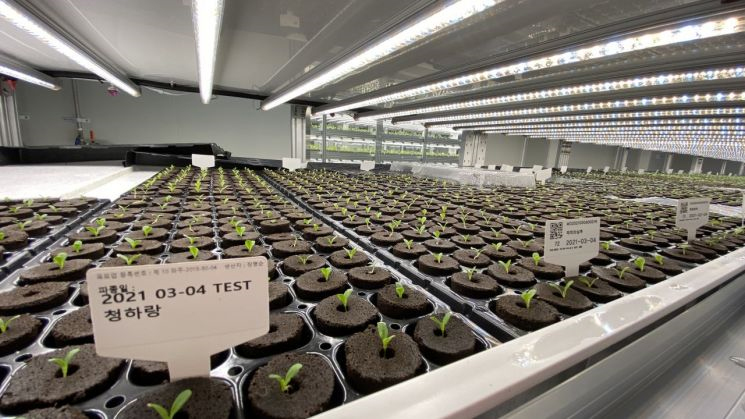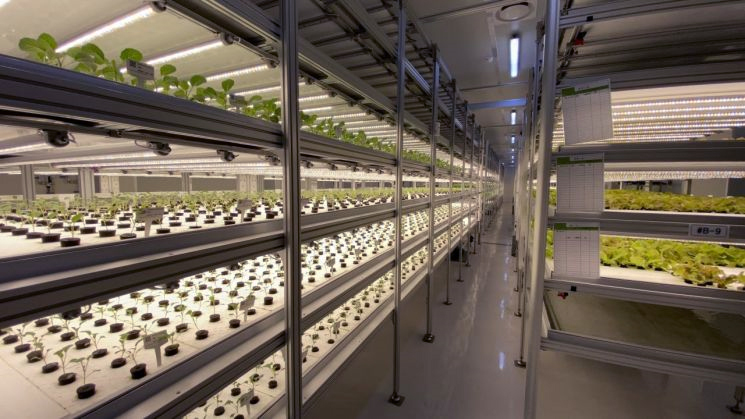Media
The Advent of Vegetable Seedlings for Your Meals
2021-03-23
[Reportage] Paju Vegetable Factory by Kyowon Wells Farm
Seedlings grown in a clean room with no germs or pesticides; a cold chain delivery system established
COVID-19 helped double the sales of the plant grower

Pesticide-free seedlings being grown in Kyowon Wells Farm = Kim Heeyoon
[Asia Economy Kim Heeyoon] Millions of Green Leaves are Sprouting under LED Lights in the Basement.
The Wells Farm vegetable factory, built in the basement of the Kyowon logistics factory in Paju, Gyeonggi Province, delivers approximately 5,000 seedlings per day. These are the vegetables that go into the plant grower that Kyowon first released in 2017. The seedlings grown in water for a month in a germ- and pesticide-free environment are allowed to develop right up to the point of harvest, measured by a cultivar, packaged vertically, and delivered to the customers. Manager Kwak Dongyup of the Development & Production Team, responsible for the production of the seedlings, explained that, “in this factory with about 2,314m2 (700-pyeong) of surface area, about 5,000 seedlings a day, or 100 million per month, are produced and delivered to the customers.” He added, “the seedlings are produced in a safe environment so that anyone can grow pesticide-free vegetables at home.”
A total of 16 types of seedlings are produced in the vegetable factory. Types and effects of the vegetables vary, from anti-cancer vegetables that stunt the growth of cancer cells and salad greens like chicory, to lettuces with proven effects for deep sleep. If you include the herbs and unique species that are being tested, the number grows to 40. The vegetable factory has 4 clean rooms and a total control system that manages temperature, humidity, and air quality, and the area is large enough to grow a maximum of 1.8 million seedlings.
A representative of Wells explained, “Public interest in plant growers for growing fresh produce at home has risen due to COVID-19. As such, we plan to diversify our seedlings and expand our rental service. We hope to achieve educational goals and successfully target the market for home plant growers to help secure the supply of safe food.”
Reporter Kim Heeyoon
Seedlings grown in a clean room with no germs or pesticides; a cold chain delivery system established
COVID-19 helped double the sales of the plant grower

Pesticide-free seedlings being grown in Kyowon Wells Farm = Kim Heeyoon
[Asia Economy Kim Heeyoon] Millions of Green Leaves are Sprouting under LED Lights in the Basement.
The Wells Farm vegetable factory, built in the basement of the Kyowon logistics factory in Paju, Gyeonggi Province, delivers approximately 5,000 seedlings per day. These are the vegetables that go into the plant grower that Kyowon first released in 2017. The seedlings grown in water for a month in a germ- and pesticide-free environment are allowed to develop right up to the point of harvest, measured by a cultivar, packaged vertically, and delivered to the customers. Manager Kwak Dongyup of the Development & Production Team, responsible for the production of the seedlings, explained that, “in this factory with about 2,314m2 (700-pyeong) of surface area, about 5,000 seedlings a day, or 100 million per month, are produced and delivered to the customers.” He added, “the seedlings are produced in a safe environment so that anyone can grow pesticide-free vegetables at home.”
A total of 16 types of seedlings are produced in the vegetable factory. Types and effects of the vegetables vary, from anti-cancer vegetables that stunt the growth of cancer cells and salad greens like chicory, to lettuces with proven effects for deep sleep. If you include the herbs and unique species that are being tested, the number grows to 40. The vegetable factory has 4 clean rooms and a total control system that manages temperature, humidity, and air quality, and the area is large enough to grow a maximum of 1.8 million seedlings.
20 Times More Productive than Bare Ground…Germs- and Pesticide-Free
COVID-19 has transformed the landscape of the agricultural industry. Add to this the effects of climate change and the ensuing increase in prices exposed agriculture’s conventional weakness against diseases and disasters. An alternative to this, Ag Tech, is rapidly growing around the world, centering on smart farms that facilitate vertical farming. The Wells Farm factory is also run intensively with various plates of seedlings piled up like an apartment. For example, the amount of lettuce production in the factory amounts to 20 times that of bare ground. Additionally, the hydroponics applied to Wells Farm was found to help plants grow 20% quicker than when grown in soil. Manager Kwak added, “the vegetable factory is currently being operated at 60% of its capacity. Depending on market expansion, our production level could respond accordingly.”
The seeds grown in a germ- and pesticide-free environment are provided by various companies like Nongwoo Bio, Asia Seedling, and the Dutch firm ENZA. The seeds are pellet-coated, and are made to be germ-free for improved quality. The soil in which the seeds are grown is made from bamboo that has been sterilized at high temperatures. Contaminants like germs and mold are 99% removed, then the soil is used for sowing. Unlike bed soil culture, which is affected by the level of microorganisms in the soil, the germ-free soil allows for stable production, according to Wells Farm. The seedlings grown like this for a month are delivered to the customer every 2 months, providing 1kg of vegetables each month (for 12 units).

The clean room at the Wells Farms factory. About 5,000 seedlings are delivered after being grown for a month in germ- and pesticide-free soil.
Cold Chain Delivery System Established…Fresh Seedlings Installed Right Away
The delivery system was also improved to supply fresh seedlings. According to Manager Kwak, “the seedlings used to be delivered via parcel service. Now, special packaging is used for vertical packaging, and protective measures like air cushion are added to minimize damage to the leaves.” The cold chain system was then added, in which the Wells Farm engineer delivers the products to the customer, as well as helps with the maintenance like checking the devices at home and replacing the filters.
Until 2019, the sales of the plant growers lingered at 9,000 after their launch in 2017. Last year, however, due to COVID-19, the sales doubled, growing to 18,000 units sold. The market prospects are promising, too. The Intellectual Property Assessment Center at the Korea Invention Promotion Association predicted that the domestic market for plant growers will expand from 60 billion won to 500 billion in 2023, by adding AI technology. Market & Market, the global market research firm, analyzed that the global plant grower market will expand to 18.4 billion dollars by 2022.
A representative of Wells explained, “Public interest in plant growers for growing fresh produce at home has risen due to COVID-19. As such, we plan to diversify our seedlings and expand our rental service. We hope to achieve educational goals and successfully target the market for home plant growers to help secure the supply of safe food.” Reporter Kim Heeyoon